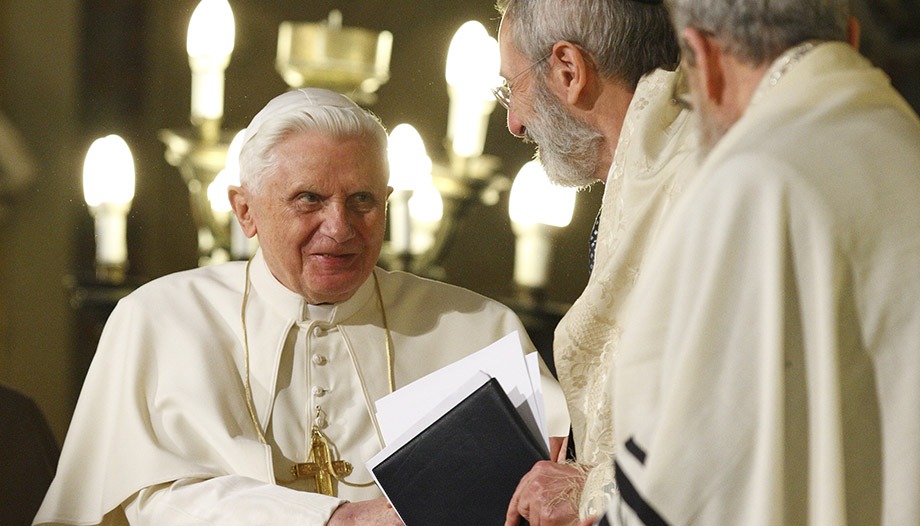 Benedict XVI passes away
Benedict XVI passes away The Magisterium of Benedict XVI
The Magisterium of Benedict XVI The spiritual testament of Benedict XVI
The spiritual testament of Benedict XVIThere are people who stand out for some eminent personality trait - for example, an artistic talent or an outstanding intelligence - but who are prevented from shining to their full potential by a certain awkwardness of character: a fiery genius, an excessive sensitivity or a shyness covered with insecurity.
Sometimes it is not a temperamental factor, but a setback or setback external to them, such as an adverse historical circumstance. And it can also be a combination of both, in an unfortunate cocktail. Fortunately, the passage of time often does justice and puts everyone in their rightful place.
This is what happened to artists such as Il Caravaggio or Vincent Van Gogh. More than one saint has left this world shrouded in controversy. I think I am not exaggerating when I say that it will take years, perhaps decades, to appreciate the intellectual, human and spiritual stature of Benedict XVI.
In the days following its recent death, last December 31In the past, there have been those who have pointed out, with presumptuous ignorance - double ignorance - his past in the Hitler Youth or have accused him of covering up the cases of pederasty perpetrated by clerics in the bosom of the Church.
However, a fact that no one can disqualify is the decision he made in 2013 to resign from the See of Peter in the face of the growing physical and psychological limitations caused by age. And it is precisely there where, if one has a minimum of intellectual honesty, one begins to glimpse the greatness of Joseph Ratzinger, a man deeply faithful to that God to whom he dedicated his best forces and to himself.
The emeritus began his pontificate by presenting himself to the faithful gathered in St. Peter's Square and to the world as a humble worker in the Lord's vineyard. Anyone who had his résumé at hand at the time would have had no choice but to frown and attribute false modesty to him. But Ratzinger was not lying. That is how he felt and that is how he had tried to spend his whole life.
He could have been one of the most prolific theologians of the twentieth century, but he accepted the invitation to become pastor of the Munich diocese and to work in the ungrateful Congregation for the Doctrine of the FaithHe was a good bookkeeper, even though he was better at books than sheep, and even though he knew that the inquisitorial stigma would be turned against him and would accompany him from then on.
His shyness was his worst defect, but surely also his best virtue, for it became the safeguard of his humility and, consequently, of an unwavering faith.
He never pretended to defend himself against criticism. He only had time for the mission entrusted to him in the service of the Church. It was only at the end of his days that he decided to put black on white. in response to allegations of a cover-up of a pedophile priest while he was bishop of Munich. He wrote a letter in which he clarified the situation, but above all in which he again asked forgiveness on behalf of the entire institution for the worst scourge of its millennial history.
Ratzinger's magisterium as Roman Pontiff is delight for the ear, nourishment for the intelligence and balm for the heart. Through him, he has acted as "pater familias", in the evangelical way, extracting from the trunk of doctrine what is good and giving it exquisitely chewed to his children. Generations of Christians will be nourished by his teachings over time.
Two external factors have worked against this pontificate, which will go down in the history books for its abrupt and unexpected epilogue: on the one hand, the prevailing relativism that the Pope himself denounced and tried to fight with his best weapons.
A relativism that has engendered, together with superficiality, that presumptuous ignorance to which I referred earlier. On the other hand, the choice of advisors and allies who did not know how to accompany him on a troubled journey. And so were unleashed crises such as that of Lefebvre's children, the misinterpretation of the Regensburg speech, the Vatileaks scandal and even the late response of the institution - not Pope Benedict - to the condemnation of pedophilia.
It is said that when he was thinking of resigning the pontificate, he shared this doubt with several of his closest advisors. They all tried to dissuade him, but he had already made up his mind in the presence of God. Time later proved that he was right to disregard their words.
History will call this generation unjust for not having understood Benedict XVI and for not having appreciated him in all his magnitude. We will have to excuse ourselves by saying that his shyness, in this age of image, did not help, or that biased and lying headlines prevented us from doing so. But in any case, I hope that she will be more accurate than us and make shine for the next generations the figure of this man of God, who under a clumsy and fragile appearance carried within him a giant.











